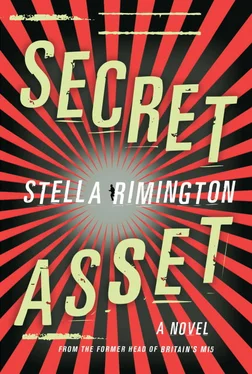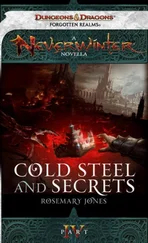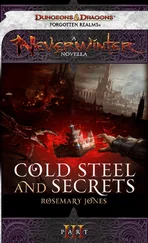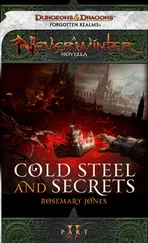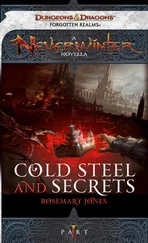Michael Binding
Patrick Dobson
Judith Spratt
Tom Dartmouth
Stephen Ogasawara
Peggy had done well, thought Liz. She had taken very little time to get used to what must seem a very alien environment.
“I know Michael Binding,” Liz announced. “And Judith Spratt.” A friend, she almost said, but didn’t. “Tom Dartmouth I’ve only just met—he’s recently come back from Pakistan. He was seconded to MI6 there for a while. Like you in reverse. And Patrick Dobson was at a meeting I went to yesterday.” She handed back the list to Peggy. “What’s Dobson’s job exactly?”
Peggy found his file. “His job is special liaison with the Home Office on operational matters. Degree from Pembroke College in Theology.” Liz groaned and Peggy gave an unexpectedly lively laugh. Thank God she’s got a sense of humour, thought Liz. Peggy continued: “He’s married. Two children. Very active in his local church.”
Liz suppressed another groan and tried not to roll her eyes. “Right. And Stephen Ogasawara. What have you got on him?”
Peggy found another file. “He read History at Wadham. Then—unusual this—he joined the Army. Six years in the Royal Signals. Served in Northern Ireland,” she said, pausing meaningfully. “As the name suggests, he’s got a Japanese father. But he was born in Bath.”
“What’s his job now?”
“He’s not here any more.”
“Oh?”
“No, he left three years ago.”
“What did he go into? A private security firm?” With that mix of military and MI5 experience, Ogasawara was probably making a small fortune as a consultant in Iraq, thought Liz. Though he might not live long enough to enjoy it.
“Not quite,” said Peggy. “It says here that he now manages a dance troupe in King’s Lynn.”
“How exotic,” said Liz, suppressing a smile.
Peggy asked, “Can I take him off the list?”
“Yes,” said Liz, then thought again. “Actually, better not. But you can certainly put him low down.” She glanced at her watch. “You should have plenty to do while I’m in Rotterdam.” Liz gestured towards the files.
“I thought I’d double-check their original applications to join MI5. And check the facts in the updates too.”
“Yes, you might as well go through the basics. And read their references.” Liz looked again a little anxiously at her watch. “I think we should probably see as many of the referees as we can. Look out for anything on the personal front that looks unusual. And obviously, any kind of Irish connection.”
As Liz got up from the table to go, Peggy said, “Do you mind if I ask who you’re seeing in Rotterdam?”
“Not at all,” Liz said. She had already decided that if they were going to work closely together, she would need to be able to tell Peggy everything. “I’m seeing a man called James Maguire. He was our source for the story that the IRA had put a secret asset into the security services. The officer he gave that information to is dead, so Maguire is the one person in the world, apart from us and the mole himself, who knows about it.”
“Do you think he can help us?”
Liz thought for a moment. “Possibly. The question is whether he will. He didn’t want to meet me.”
“Well good luck then,” said Peggy.
“Thanks,” said Liz, her lips pursed. “I have a feeling I’ll need it.”
The water in the Old Harbour of Rotterdam was sea green, and slopped against the sides of the canal boats and small tugs moored at one end. It was twilight in mid-May, the air was mild, and the light rain felt soft on her face. Liz looked out across the small body of water, relic of the age when it had been the city’s main port. Levelled by bombing in the War, Rotterdam was almost entirely modern; its inhabitants had decided not to reconstruct the city as it had been before 1939 but instead to start from scratch. The results were architecturally renowned but bleak to look at; this genuinely old sector of the city was a small sanctuary from the relentlessly new.
The café across the harbour was on the ground floor of an old building of dark brick, and lit inside by wall lamps which cast a rich orange glow; at the tables on the veranda candles in bowls provided the sole illumination. Although she had only mug shots from which to identify him, Liz was confident he was not among the café’s few customers. But as the dark now moved in as if by stealth, she suddenly saw him. A tall figure, lean to the point of gauntness, walking slowly along the far edge of the harbour towards the café. He wore khaki trousers and a long raincoat that hung loosely from its padded shoulders, and he carried a newspaper rolled up under one arm.
Liz gave him five minutes to settle, then moved quickly around the perimeter of the harbour, and into the café. She spotted him at a corner table and, as the man looked up and nodded, Liz sat down across from him, putting her own coat on an empty chair. She said, “Hello, Mr. Maguire. I’m Jane Falconer.”
The man called Maguire didn’t say hello, only remarking curtly, “I hope you were careful coming here.”
She had certainly been careful. Liz had flown to Amsterdam rather than direct to Rotterdam’s small airport, then pursued a standard tourist agenda—a taxi straight to the Rijksmuseum, a tour of the Anne Frank house, and lunch outdoors at a canal-side bistro near Dam Square. Then a train to Rotterdam and—Liz had been particularly careful at that point—an unaccompanied walk to the Old Harbour. She sighed inwardly at the time-consuming nature of it all.
Liz felt at some disadvantage, with her limited experience of the Province. Maguire was used to dealing with old Northern Ireland hands—like Ricky Perrins and Michael Binding. All men and all veterans of the insular yet vastly complicated world of that conflict. Liz couldn’t even pretend to follow all its ins and outs.
But then I don’t have to, she told herself, deciding she could use her comparative ignorance to advantage. She was not operating in the traditional framework of the place, because all had changed. She was going to have to appeal to Maguire on personal grounds. The question was whether he could respond to that, or whether he would regard his involvement as over, now that peace of a kind held in Northern Ireland.
“I was careful,” she assured him.
He looked unappeased. “I thought I’d made it clear I told everything I know to your colleague Rob Petch,” he said, using Ricky Perrins’s working alias.
“I’m sure you did,” said Liz, “but Rob’s dead.” You know that, thought Liz. She had told him when she’d rung him, trying to arrange this meeting.
“I’m sure he reported what I’d said,” said Maguire, giving no ground.
Liz nodded in acknowledgement of this, but then said firmly, “I wanted to hear the story from you direct. Just in case Rob left something out that could help.”
“Help with what? I told him, Keaney’s secret asset, whoever they were, was never activated. I really don’t see what you want from me.” His voice was starting to rise. Liz looked anxiously around for a waiter, and one came over—a tall, moustachioed man in a white apron.
“ Kaffe ?” asked Liz, trying to recall her ten words of Dutch.
The waiter looked down at her with ill-disguised amusement. “White or black, madam?” he said in flawless English. They might have been at the Savoy.
“White please,” she said with a smile. She had forgotten the essential bilingualism of the Dutch. They listened to the Today programme and watched the ITN news, and read more English-language novels than all the inhabitants of London. One of Liz’s friends from university had lived for six months in Amsterdam and never felt the need to learn a word of Dutch, such was the natives’ aptitude for English.
Читать дальше
